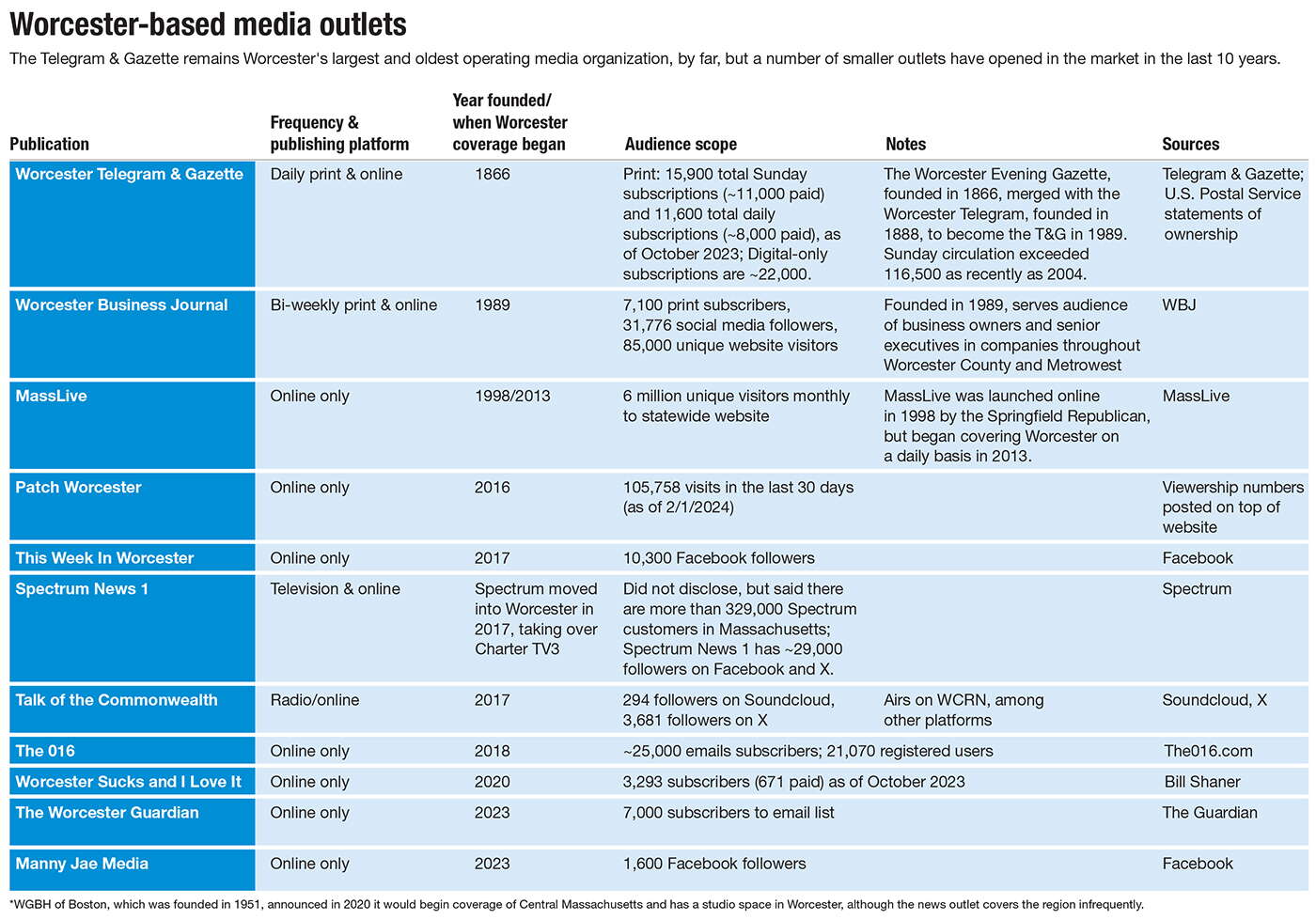
The new Worcester media, part 1: The downsizing of the Telegram
 Photo | Christine Peterson
After the Worcester Telegram & Gazette reduced the size of its lease in the Mercantile Center, the company's logo was removed from the top of the building.
Photo | Christine Peterson
After the Worcester Telegram & Gazette reduced the size of its lease in the Mercantile Center, the company's logo was removed from the top of the building.
More Information
In November 2013, one month after buying the Worcester Telegram & Gazette, Boston billionaire John Henry announced his plan to resell the paper. His parting promise was to sell to a local owner.
Henry told T&G staff, "It's important for the Telegram & Gazette to be under local ownership," the paper reported at the time. "If we don't find the right owner, you're stuck with me."
Henry did find a new owner, but it wasn’t local. In May 2014, he sold the paper to Florida-based Halifax Media Group. After a series of mergers, the company became part of
Gannett, a $2.66-billion conglomerate operating 200+ daily papers, according to Forbes.
The first day after the sale to Halifax closed, 20 of the T&G’s 80 newsroom staff members were laid off, according to Dave Nordman, who was then a managing editor and later became the paper’s executive editor. Over the next two years, another 20 were let go, and the paper today has about 20 reporters, according to its website.
With resources spread thinner, the 75% drop in staff at Worcester’s paper of record occurred alongside a decline in the quantity and quality of news coverage, the Worcester Business Journal found by analyzing T&G articles over the past decade. The result, largely, has been a trend toward so-called transcription journalism relying more on press releases than exclusive reporting to fuel news.
This story is not unique to Central Mass. The plethora of free news online has made it difficult for local newspapers to remain profitable. Since 2014, major corporations like Gannett have bought more than 1,000 local papers, according to research by the University of North Carolina. These sales often come with staff cuts, reducing the capacity of newsrooms to cover local news.
With its paper of record shrinking, Central Mass. has seen several small media companies emerge to try to fill the gap. Together, they offer a more diverse range of news sources with different business models, but none compare in scale or reporting power with the T&G, even with its reduced resources.
Transcription journalism
During its decade of non-local ownership, the T&G’s coverage has changed in both quantity and quality. These changes illustrate the increasingly limited resources, as the region’s paper of record is publishing fewer stories and relying more on press releases rather than original reporting. The paper published more than 2,400 articles in September 2011 compared with 506 in September 2023, the T&G’s online archives show.
WBJ analyzed major publications’ coverage of one of Worcester’s largest economic investments in the past 15 years: the $160-million construction of the Polar Park baseball stadium. Looking at each story from Polar Park's groundbreaking in June 2019 to September 2019, WBJ quantified how many sources were quoted, who those sources were, and where the news came from.
A quarter of the T&G’s stories during this time were based on press releases or events. That marks a decrease in original reporting. In 2010, when covering the $565-million CitySquare development, the T&G did not use press releases to report any of the stories in the three months after CitySquare’s groundbreaking. Instead, reporters based their articles on city government meetings, construction updates, and exclusive news from sources. These primary sources avoid the vetted narrative of press releases, which can favor those who issue them.

“You have a lot of transcription journalism,” said Mark Henderson, former T&G reporter who runs news aggregator The 016.com. “They didn't realize that they were really doing transcription journalism; they were just trying to file their stories and go home.”
Even with its reduced staff, the T&G has provided important accountability journalism. The paper has won awards for its lengthy battle to obtain police records from the City of Worcester and expose misconduct in the department.
"For more than 150 years, the Telegram & Gazette has been the most trusted source for local news in Worcester,” said T&G Executive Editor Michael McDermott. “We continue to emphasize accountability reporting.”
Still, the paper has to carefully pick its spots, as the capacity to do this kind of time-consuming reporting is constrained by limited resources.
Decades of downsizing
Like many local papers, the T&G has struggled to maintain subscriptions, a primary source of media revenue.
Paid print subscriptions for the Sunday T&G had fallen in half before John Henry came onto the scene, from more than 116,500 in March 2004 to around 57,700 in March 2014, according to audited circulation reports shared with WBJ. As of October 2023, Sunday T&G paid print subscriptions were 11,000.
The drop in circulation and advertising dragged down the paper’s value as it changed hands. In the mid-1980s, the T&G’s local owners sold the paper to the San Francisco Chronicle, a then-family owned and operated publisher. After a little more than a decade, in 1999, the Chronicle sold the T&G for $300 million to The New York Times Co. This had followed The Times purchase of the Boston Globe for $1.1 billion in 1993.

With the purchase by the New York Times Co., there was much initial enthusiasm in the newsroom about the sale, according to a 2016 T&G article reflecting on that period at the paper. Indeed, a partnership between the Globe and T&G was blossoming, but those hopes fizzled in 2013, Nordman said.
Henry bought the Globe and T&G for $70 million in 2013, approximately two cents to the dollar compared with the $1.4-billion combined price tag paid for the two dailies in the 1990s.
It wasn’t a problem unique to the T&G. In the same decade before Henry bought the T&G, circulation for daily newspapers across the country fell by about 26%, according to Pew Research Center. Since 2005, the country has lost 2,900 daily and weekly newspapers, putting the nation on track to lose a third of its papers by the end of 2024, a Northwestern University study from 2023 found.
A number of outside forces factored into this decline.
“Craigslist came along and started publishing classified ads mostly for free, thus taking 40% of newspaper revenues almost overnight. Google and Facebook took most of the rest,” said Dan Kennedy, a journalism professor at Northeastern University in Boston. “The rise of hedge-fund and private-equity ownership squeezed the remaining life out of newspapers, taking the remaining revenues and using them to enrich their owners and pay down debt.”
The result is fewer journalists, which has hit smaller, non-metropolitan communities the hardest. Prior to Henry’s sale, the T&G included local sections focused on six Central Massachusetts regions outside Worcester.
“The Telegram & Gazette is a newspaper, but if you look back 10 or 15 years ago, it was seven newspapers,” Nordman said.

Those locally zoned sections were eliminated over the years starting around 2010, and Worcester Magazine – a weekly alternative media publication – was pulled under the same umbrella as the T&G in 2020, resulting in a cut of its five editorial staff members down to one.
Gannett owned a number of other local papers not directly affiliated with the T&G, including the Millbury-Sutton Chronicle, Grafton News, The Clinton Item and The Landmark, which covers the Wachusett area north of Worcester. After Gannett announced it would lay off the editors of those four publications, CherryRoad Media, a New Jersey-based company founded in 2020, bought them and they have continued to run, in many cases with a single editorial staffer.
“Worcester has a ghost paper, and it happens to be owned by Gannett,” said Walter Robinson, an editor-at-large at the Boston Globe. “Gannett’s not into journalism at all anymore. They’re into making as much profit as they can for as long as they can before they get out.”

Filling the gap
Smaller media organizations emerged since Henry’s sale to try to make up for reporters bleeding out of the T&G.
“I do feel that there is still news coverage, just in different forms,” said Andy Lacombe, news director of Spectrum News 1, which provides televised journalism in Worcester.
In Central Mass., those new outlets included statewide organizations that began focusing on the region, like the Springfield-based MassLive and Boston-based WGBH, which started designating reporters to the Worcester area in 2013 and 2020. Online-only startups like This Week In Worcester launched in 2017, and local cable provided Spectrum, which expanded its Spectrum News 1, partnered with the national Spectrum brand to provide 24/7 coverage starting in 2017.

“The quality of journalism in the city of Worcester right now is better on a day-in and day-out basis than it has been for 20 years,” said Henderson. “That gets lost in the fact that it's not just happening because of one entity.”
Others are more pointed in their criticism.
“Since the Telegram has been in decline … there is a space here, and that's what MassLive advertised itself as filling back when it launched,” said Bill Shaner, author of the Substack newsletter Worcester Sucks and I Love It. “But they're not acting like the Fourth Estate. They're just doing essentially PR work for the city.”
Even with its reduced staff of 20 editorial employees, the T&G remains the largest newsroom in Central Massachusetts by a good margin. Spectrum News 1 has seven staffers who focus primarily on the greater Worcester area, per its website.
“Journalism has to hold powerful people and institutions accountable. You can't do that with one or two reporters,” Robinson said.

MassLive, owned by New York-based Advanced Publications., based 35% of its coverage of Polar Park on press releases or events in the first three months after the stadium's groundbreaking, and 42% of Spectrum News 1’s coverage was based on these. Both are more likely to rely on press releases than the T&G, which used original reporting for 25% of its Polar Park stories in this time period.
Noah Bombard, the former senior managing editor for MassLive Worcester, said he took accountability journalism very seriously during his tenure, which included the aforementioned Polar Park coverage. He now heads communications for the Massachusetts Executive Office of Housing and Livable Communities under former Worcester City Manager Ed Augustus.
Compared with the T&G and MassLive, Spectrum had the most variety of voices in its coverage. More than 40% of its quoted sources for Polar Park were people outside the city government and development team behind the project. About a third of the T&G’s quoted sources were non-government, non-development folks. Less than 20% of MassLive’s sources came from outside that circle.
“You aren't getting any stories about issues that the people we cover don't want us to know,” said Robinson. “Watchdog journalism does not exist in most cities in Mass. and that would include Worcester.”
CORRECTION: An earlier version of this article incorrectly referred to Spectrum News 1 as broadcast news. The station actually refers to itself as televised news, as Spectrum News 1 is not available via over the air broadcast. An earlier version of this article also stated that MassLive is the digital arm of The Republican, when in fact it is owned by New York-based Advanced Publications, and misstated Noah Bombard's title at MassLive. His title was the senior managing editor, not editor.

Not mentioned: The Scarlet, Student newspaper of Clark University, (this paper likely does more original reporting than the Telegram).













3 Comments